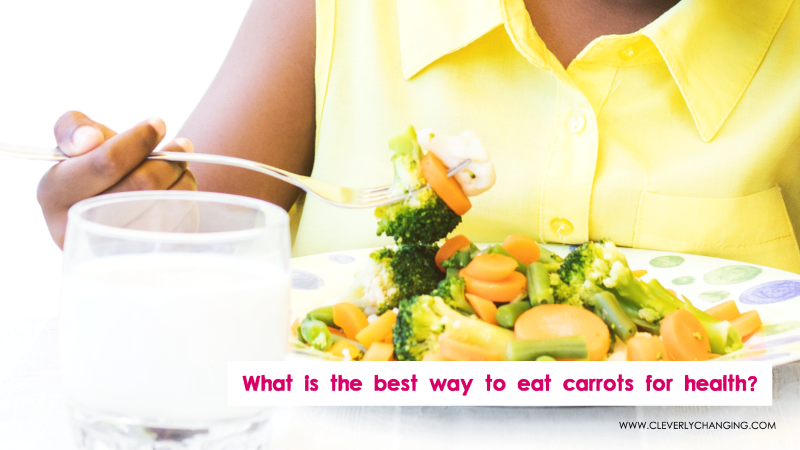Carrots, with their vibrant color and crisp texture, are not only a delightful addition to any meal but also a nutritional powerhouse. Eat carrots for health because these root vegetables are packed with essential nutrients, antioxidants and fiber, making them incredibly beneficial for your overall well-being. In this comprehensive article, we will delve into the remarkable advantages of including carrots in your diet and discuss the best ways to consume them to maximize their nutritional value. Get ready to discover why carrots are a vegetable that deserves a prominent place on your plate.
The Nutritional Powerhouse of Carrots
Carrots are a treasure trove of essential nutrients that contribute to optimal health. These vegetables are particularly known for their high content of beta-carotene, a pigment that gives them their bright orange color. Beta-carotene is a precursor to vitamin A, a vital nutrient for maintaining healthy vision, supporting immune function and promoting skin health.
Additionally, carrots provide a rich array of vitamins and minerals. They are a good source of vitamin K, which is essential for blood clotting and bone health. Carrots also contain vitamin C, an antioxidant that supports the immune system and aids in collagen production, promoting healthy skin and wound healing. Furthermore, they contain potassium, a mineral important for regulating blood pressure and fiber, which supports healthy digestion and contributes to a feeling of fullness.

The Benefits of Carrots for Healthy Living
Promotes Healthy Vision
Carrots are widely known for their positive impact on vision health. This is primarily due to their high levels of beta-carotene, which is converted to vitamin A in the body. Vitamin A plays a crucial role in maintaining good eyesight and may help prevent age-related macular degeneration and night blindness.
Supports Skin Health
The antioxidants present in carrots, such as beta-carotene and vitamin C, contribute to skin health. These antioxidants help protect the skin against damage from free radicals, reduce inflammation, and support collagen production, improving skin elasticity and a more youthful appearance.
Boosts Immunity
Carrots are rich in antioxidants and phytonutrients that support a healthy immune system. These compounds help combat harmful free radicals, reduce inflammation, and enhance immune cell activity, thereby strengthening the body’s defense against infections and diseases.
Aids in Digestion
Carrots are an excellent source of dietary fiber, both soluble and insoluble, which is crucial for maintaining a healthy digestive system. Fiber adds bulk to the stool, promotes regular bowel movements and helps prevent constipation. Additionally, the fiber in carrots acts as a prebiotic, supporting the growth of beneficial gut bacteria.
Supports Heart Health
The potassium content in carrots, combined with their fiber and antioxidant content, contributes to heart health. Potassium helps regulate blood pressure, reducing the risk of hypertension and cardiovascular diseases. The antioxidants in carrots also help prevent oxidative stress and inflammation, factors that can contribute to heart problems.
Enhances Oral Health
Chewing carrots stimulates saliva production, which plays a vital role in maintaining oral health. Saliva helps neutralize acids produced by harmful bacteria in the mouth, reducing the risk of cavities and gum diseases. The fiber in carrots also acts as a natural toothbrush, aiding in the removal of plaque and food particles.
Best Ways to Consume Carrots for Maximum Benefits
Raw and Crunchy
Eating carrots in their raw form is a fantastic way to enjoy their natural crunchiness and preserve their nutritional value. Simply wash, peel (if desired) and cut them into sticks or rounds for a refreshing and healthy snack. Pair them with hummus, yogurt dip or nut butter for added flavor and protein.
Juicing
Juicing carrots allows you to extract their nutritional goodness in a concentrated form. Freshly squeezed carrot juice benefits you by providing high dose of nutrients, which is an easy as well as tasty beverage. To enhance the taste and nutrition, consider adding a splash of lemon juice or a hint of ginger to the mix.
Roasting
Roasting carrots brings out their natural sweetness and intensifies their flavors. Preheat your oven to 400°F (200°C). Toss peeled and cut carrots with a drizzle of olive oil, sprinkle with your favorite herbs and spices, such as thyme, rosemary or cumin and season with salt and pepper. Roast for about 25-30 minutes or until they are tender and slightly caramelized. Roasted carrots make a delicious and nutritious side dish that complements a wide variety of main courses.
Soups and Stews
Carrots are a fantastic addition to soups and stews, providing both flavor and nutrition. Chop them into small pieces and add them to your favorite homemade or store-bought soup. Carrots pair well with ingredients like tomatoes, onions, garlic and spices, creating a comforting and nourishing meal.
Steaming
Steaming carrots is a gentle cooking method that helps retain their nutrients and vibrant color. Peel and slice carrots into uniform pieces and steam them until they are tender-crisp. Steamed carrots can be enjoyed on their own as a side dish, tossed in salads or used in stir-fries.
Carrot-Based Dips and Spreads
Get creative in the kitchen by incorporating cooked carrots into dips and spreads. Blend cooked carrots with herbs, spices and healthy fats like tahini or Greek yogurt to create flavorful and nutritious accompaniments. Carrot hummus, carrot-tahini dip and carrot-ginger spread are just a few examples of the delicious possibilities.
Baked Goods
Grated carrots add moisture, natural sweetness and a vibrant color to baked goods. Incorporate them into muffins, cakes, bread or cookies for a healthy twist. Carrot cake is a classic example of a scrumptious treat that highlights the natural goodness of carrots.
Carrot juice – a tasty and healthy beverage
Carrot juice is highly beneficial due to its concentrated dose of nutrients and antioxidants. Drinking carrot juice allows you to enjoy the abundance of vitamins, minerals and phyto nutrients present in carrots in a highly valuable form. The high content of vitamin A, supports healthy vision, boosts immune function and promotes skin health.
Carrot juice is also rich in vitamin C, which acts as a powerful antioxidant, protecting the body against oxidative stress and bolstering the immune system. Additionally, carrot juice provides an array of other essential vitamins and minerals, including potassium, vitamin K and fiber.
Regular consumption of carrot juice can help improve digestion, enhance cardiovascular health and support overall well-being. Its refreshing taste, convenience and numerous health benefits make carrot juice an excellent addition to a balanced and nutritious diet.
To Sum Up
Carrots are more than just a versatile and tasty vegetable; they offer various health benefits that contribute to overall well-being. From supporting healthy vision and promoting skin health to boosting immunity and aiding digestion, the nutritional power of carrots is undeniable. Whether consumed raw, juiced, roasted, steamed or incorporated into various dishes, there are numerous delicious and creative ways to include carrots in your meals. So, embrace the incredible benefits of carrots and let this vibrant vegetable elevate your healthy living journey.


